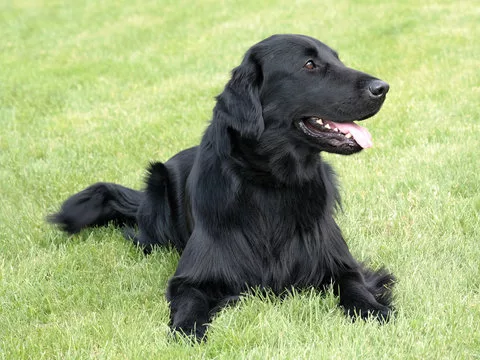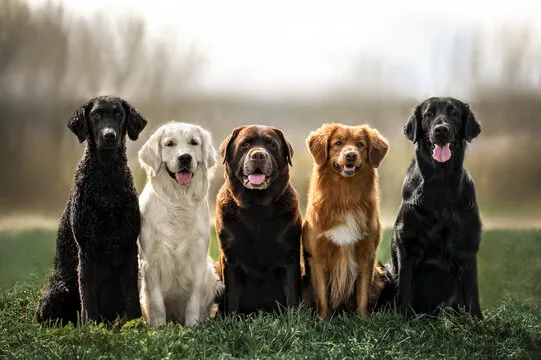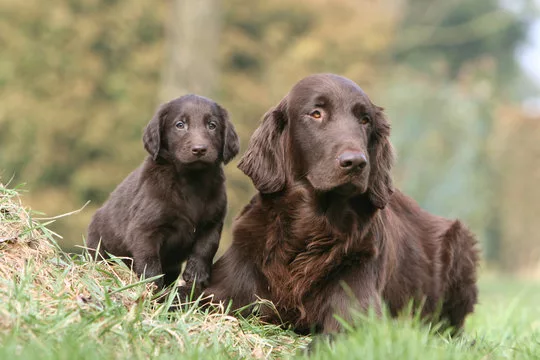The Flat-Coated Retriever is a remarkable breed of dog, known for its intelligence, athleticism, and affectionate nature. These handsome canines have graced the world with their presence for centuries, and their popularity continues to soar. Whether you’re an experienced dog owner or a first-time pet parent, the Flat-Coated Retriever is sure to bring joy and companionship into your life.
A Brief History of the Flat-Coated Retriever
The origins of the Flat-Coated Retriever can be traced back to the 19th century, when English sportsmen sought to develop a versatile retriever capable of retrieving waterfowl from both land and water. Through careful breeding, they combined the traits of various gundog breeds, resulting in the Flat-Coated Retriever we know and love today.

The Flat-Coated Retriever quickly gained popularity among hunters and field enthusiasts, valued for its keen retrieving skills, eagerness to please, and adaptability to various training methods. However, the breed’s numbers declined during World Wars I and II, nearly leading to its extinction.
Thankfully, dedicated breeders worked tirelessly to preserve the Flat-Coated Retriever’s legacy, and the breed gradually regained its footing. Today, the Flat-Coated Retriever is recognized by major kennel clubs around the world and is a beloved companion to many families.
Characteristics and Physical Appearance
The Flat-Coated Retriever is a medium-sized breed, standing at 22-24 inches tall and weighing between 55-70 pounds. They have a distinctive flat, glossy coat that comes in solid black or liver (a dark brown color). Their coat is dense and waterproof, making them well-suited for retrieving game from water.
Their head is long and elegant, with a broad skull and a well-defined stop. Their eyes are dark and expressive, giving them an intelligent and friendly appearance. The Flat-Coated Retriever’s ears are set high and hang close to their head, adding to their overall regal look.
Temperament and Personality
One of the most endearing qualities of the Flat-Coated Retriever is their joyful and outgoing personality. They are known for their boundless energy and love for life, making them a perfect companion for active individuals or families. They thrive on human companionship and make excellent family dogs, as they are gentle and patient with children.
Flat-Coated Retrievers are also highly intelligent and eager to please, making them easy to train. They excel in various activities such as obedience, agility, and tracking. However, they do have a mischievous streak and may occasionally test their boundaries, so consistent training and positive reinforcement are essential.
Health Concerns and Care
Like all breeds, the Flat-Coated Retriever is prone to certain health issues that potential owners should be aware of. Responsible breeders will conduct health screenings on their breeding dogs to reduce the risk of passing on genetic conditions. Some common health concerns in Flat-Coated Retrievers include:

- Hip and elbow dysplasia: This is a condition where the hip or elbow joint does not develop properly, leading to pain and mobility issues.
- Cancer: Unfortunately, Flat-Coated Retrievers have a higher incidence of cancer compared to other breeds. Regular check-ups and early detection are crucial for managing this disease.
- Bloat: Also known as gastric dilatation-volvulus (GDV), this is a life-threatening condition where the stomach twists, cutting off blood flow and causing severe pain. Immediate veterinary attention is necessary if bloat is suspected.
Aside from these health concerns, Flat-Coated Retrievers require regular grooming to maintain their beautiful coat. Weekly brushing and occasional baths are recommended, and their ears should be checked regularly for any signs of infection.
Training and Socialization
As mentioned earlier, Flat-Coated Retrievers are highly trainable and eager to please. However, they do have a stubborn streak and may become bored with repetitive training methods. It’s essential to keep training sessions fun and engaging to maintain their interest.
Early socialization is crucial for Flat-Coated Retrievers, as they can be reserved or wary of strangers if not properly introduced to different people and environments. Positive experiences during puppyhood will help them develop into well-adjusted and confident adults.
Exercise and Activity Needs
Flat-Coated Retrievers are an active breed and require plenty of exercise to keep them physically and mentally stimulated. Daily walks, runs, or playtime in a fenced yard are necessary to prevent boredom and destructive behaviors. They also excel in activities such as swimming, hiking, and retrieving games.
It’s important to note that Flat-Coated Retrievers are not suited for apartment living. They thrive in homes with a yard where they can run and play freely. If left alone for long periods, they may become anxious and resort to destructive behaviors.
Finding a Flat-Coated Retriever
If you’re interested in adding a Flat-Coated Retriever to your family, it’s crucial to find a reputable breeder who prioritizes the health and well-being of their dogs. You can search for breeders through national kennel clubs or attend dog shows and events to meet breeders in person.
Another option is to adopt a Flat-Coated Retriever from a rescue organization. Many purebred dogs end up in shelters due to various reasons, and adopting one can give them a second chance at a loving home.
Before bringing a Flat-Coated Retriever into your home, make sure you have the time, resources, and commitment to provide for their needs. This includes proper training, socialization, and exercise, as well as regular veterinary care.
Famous Flat-Coated Retrievers

Flat-Coated Retrievers have captured the hearts of many, including some famous individuals. Here are a few notable Flat-Coated Retrievers throughout history:
- “The Peter Pan Dog”: J.M. Barrie, the author of Peter Pan, owned a Flat-Coated Retriever named Luath. He was the inspiration for Nana, the beloved dog in the story.
- “The First Dog on the Moon”: In 1969, Apollo 11 astronauts Neil Armstrong and Buzz Aldrin brought a Flat-Coated Retriever named Charlie Brown with them to the moon. He was the first dog to travel to space.
- “The Most Decorated Dog of World War I”: A Flat-Coated Retriever named “Jack” served in the British Army during World War I and received numerous medals for his bravery and service.
Frequently Asked Questions about Flat-Coated Retrievers
- Are Flat-Coated Retrievers good family dogs?
Yes, Flat-Coated Retrievers make excellent family dogs due to their friendly and gentle nature. They are great with children and other pets, making them a perfect addition to any household.
- How much exercise do Flat-Coated Retrievers need?
Flat-Coated Retrievers are an active breed and require at least an hour of exercise every day. This can include walks, runs, playtime, or participating in activities such as swimming or retrieving games.
- Do Flat-Coated Retrievers shed a lot?
Yes, Flat-Coated Retrievers have a thick, double coat that sheds moderately year-round. Regular brushing can help manage shedding, but expect some fur around the house.
- Are Flat-Coated Retrievers easy to train?
Yes, Flat-Coated Retrievers are highly intelligent and eager to please, making them easy to train. However, they do have a stubborn streak and may require consistent training and positive reinforcement.
- Do Flat-Coated Retrievers have any health concerns?
Like all breeds, Flat-Coated Retrievers are prone to certain health issues such as hip and elbow dysplasia, cancer, and bloat. Responsible breeders will conduct health screenings on their breeding dogs to reduce the risk of passing on genetic conditions.
Video
Conclusion
The Flat-Coated Retriever is a wonderful breed that offers endless love, joy, and companionship to its owners. Their friendly and outgoing nature, coupled with their intelligence and athleticism, make them a perfect fit for active individuals or families. With proper care, training, and socialization, the Flat-Coated Retriever will be a loyal and devoted companion for many years to come.